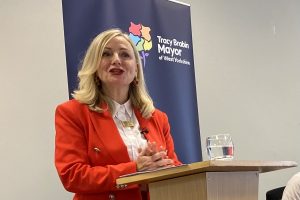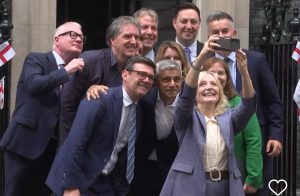Business leaders reveal economic hopes and challenges

2023 was a tough year for many of the region’s businesses. Geopolitical disruption, high energy prices and supply costs increased the cost of doing business, the cost-of-living crisis reduced consumer spend, and high interest rates increased the cost of investment.
These pressures eased as the year went on, but by year-end the economy was still in low gear. The purchasing manager’s index at the end of December stood at 50: an improvement, but distinctly neutral.
At our 2024 Outlook round table, supported by Blacks Solicitors, we asked business leaders from a wide spectrum of firms to share their hopes for the coming year, and what challenges they foresaw.
Richard Morton, banking partner at Blacks, said he expected interest rates to come down, but not straight away. “In terms of economics I’m pretty optimistic about inflation. It was 3.9% in November, 4% in December. I think we’ll probably see quite a quick drop in inflation, and then I think we’ll probably see the bank rate come down towards the beginning of summer.
“That’s caveated by all the geopolitical stuff that’s going on, but I’m relatively optimistic that we’ll start getting interest rates coming down and therefore a bit of certainty.”
All attendees shared Morton’s expectations of a further reduction in interest rates. Others cited resilience and falling inflation as a cause for optimism.
Claire Webb, managing director of Bradford retail logistics specialist Advanced Supply Chain Group, said she was also keen to see an easing of inflation and interest rates. “I’d really like to see an easing in the cost of living, because it goes hand in glove with consumer confidence. And this might be a little controversial, but I’m really interested to see if there’s a change in government. I’m wondering if it might give people a little pep if they think they’ve got a government that’s going to bring about some change.”
Ben Priestley, finance director for specialist manufacturer Mansfield Pollard, which makes air management equipment used in data centres, said he expected greater liquidity.
“I am genuinely optimistic about 2024/5,” he said. “As a business position, I think there’s going to be some more money coming into the space, probably in the second half of this year, into 2025. I also think a change of government will be good outside of the political side of things, because again, what generally happens is people start throwing money and ideas around. That can only be a good thing in terms of the business cycle. I think that by the time we exit 2024 people’s perspectives will be brighter.”
In the immediate future, however, several expected the economy to remain flat and resilience to remain a key strategy.
Beckie Hart, Yorkshire and Humber director for the Confederation of British Industry, said, “I think if the businesses in this area and further afield can really keep up the level of resilience that they’ve shown so far I would find that very encouraging, especially with all the headwinds that are facing them. I completely agree with the point on inflation and interest rates, but I think resilience in a stagnant economy calls for a little bit of cheer.”
Since the Brexit vote in 2016 sterling has remained at relatively weak levels against the dollar and euro. Total UK exports exceeded 2019 values in 2022 and 2023, though the proportion exported to the EU had fallen.
Chris Black, managing director of audio entertainment firm Sound Leisure and president of Leeds Chamber of Commerce, said his business exported around 80% of its products.
“We’re probably bucking the trend. I know exports are down to Europe, but we’ve actually doubled our exports in the last two years. But there are still the pressures of being based here in Yorkshire. We’ve got costs we’re not in control of.”
One of Black’s key concerns was energy prices. He said his factory gas bill had risen from £2,500 in December 2022 to £9,000 in December 2023. “We were tied into a very low price to start off with, but we’ve seen them growing so much we have people sat in jumpers on the factory floor now. To me, that’s just crazy.”
Naveen Ahmed, founder and managing director of property and hospitality firm Parklane Group said he remained as concerned about energy costs now as he did a year ago.
“It has forced everyone to become a lot more efficient,” he said. “We have solar panels now, and buildings have better controls to make sure switches are not left on. So that has helped.”
Darrryl Short, managing director of mobile car repair firm Smart Repairs, said that although fuel prices had dropped since their peak they continued to be a concern. “We’ve looked at the possibility of using electric vans, but the charging network isn’t available to use them properly for a mobile business.”
This is the first of two articles from the Outlook 2024 round table. The next article will look at particular challenges and the impact of AI.









